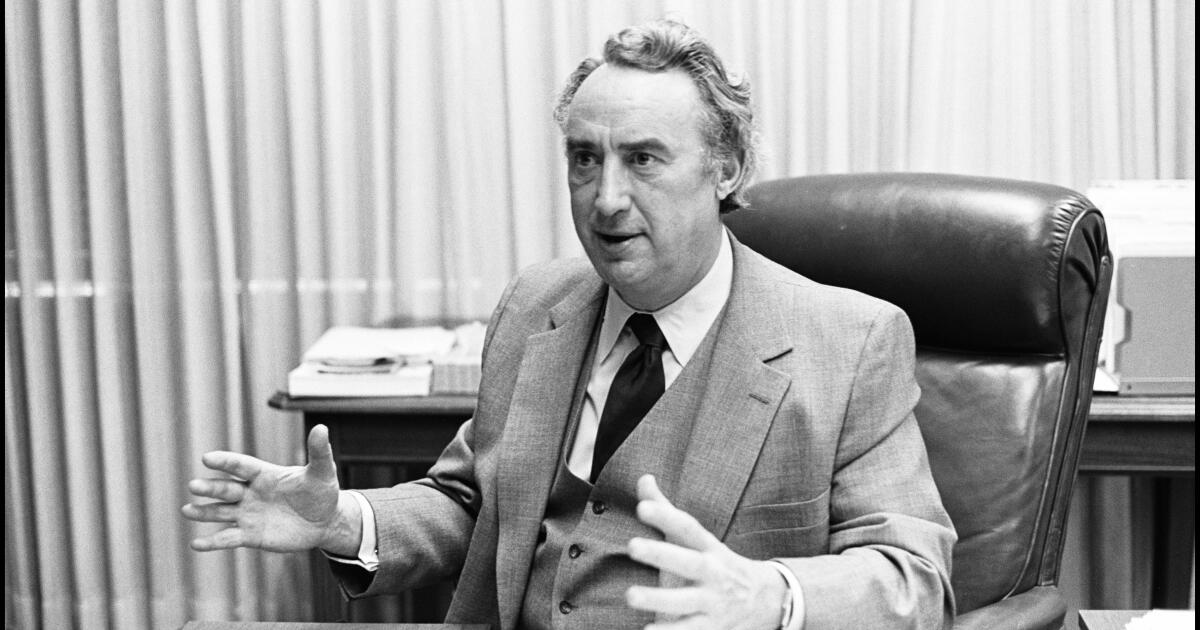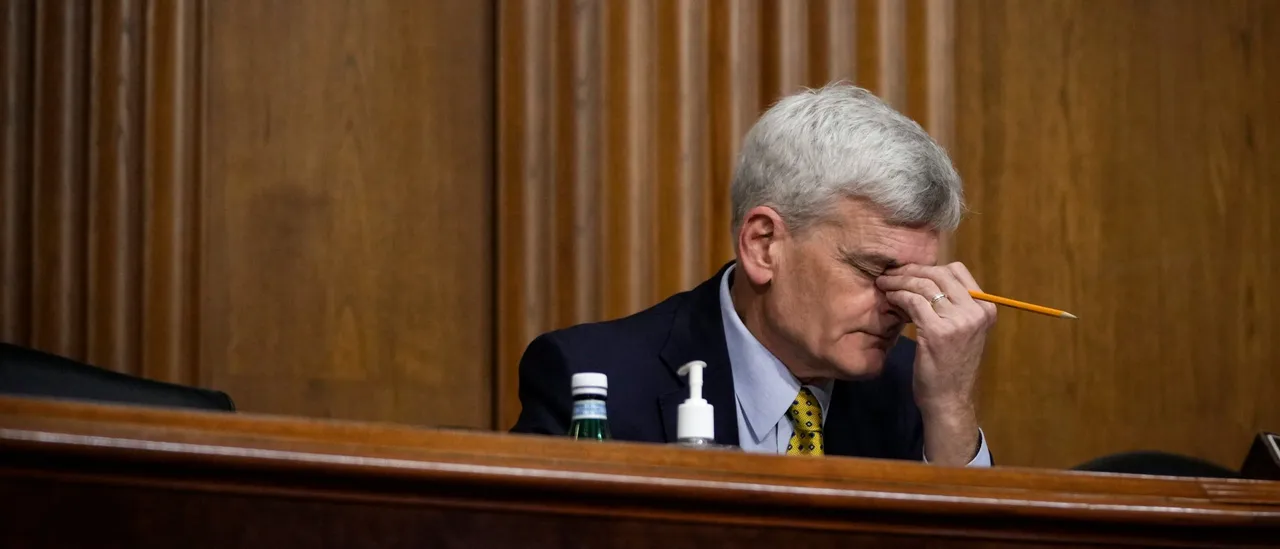
A powerful California Democrat with national political aspirations gerrymandered political maps to elect more Democrats to the House of Representatives. He defended the redistricting as the only fair response to Republican power grabs in other states and to a Republican president intent on dismantling government.
No, this is not about Gavin Newsom in 2025.
Today, I want to take you back to 1981 and the redistricting power play engineered by Rep. Phil Burton. The powerful and bombastic San Francisco lawmaker boasted that his tortured political boundaries were “my contribution to modern art.”
The net result became clear in the 1982 midterm election: Democrats leapt to a 28-17 advantage in House seats in California, a net gain of six seats from the prior Congress. That helped Democrats gain 26 seats nationally, as they sought to offer a strong alternative to Republican President Reagan.
It’s worth recalling those four-decade-old battles today, as California once again finds itself at the center of a national maelstrom about how our national legislature should be elected and what is fair.
Burton was driven by political ambition
Even outside the redistricting fight, Burton established himself as a powerful force in Congress. He championed civil rights, helped create the Golden Gate National Recreation Area and expanded wilderness protections nationwide.
Burton also enjoyed smoking, drinking and bare-knuckle politicking. When Thomas “Tip” O’Neill Jr. of Massachusetts ascended to the House speakership in 1976, the position of majority leader came open and Burton was the favorite. But his rough tactics — trading votes and retaliating against opponents — rubbed enough of his fellow Democrats the wrong way that Rep. Jim Wright of Texas won the majority leader position by a single vote. Wright, not Burton, eventually rose to the powerful speaker’s office.
Confidants said Burton never got over that loss. According to biographer John Jacobs, it was part of what fueled the San Francisco Democrat as he began redrawing House boundary lines in 1981. Burton was determined to show his fellow party members the importance of fighting for power.
That could be seen as foreshadowing Gov. Newsom’s arguments that Democrats have to respond to Republicans’ use of redistricting as a partisan weapon with more than just high-minded calls for “fairness.”
Newsom’s plan has many parallels to Burton’s
Back then, Democratic Party members saw Reagan as an existential threat. Their expressions of concern pale compared with what the party says about President Trump.
Newsom has justified a redistricting that could add five Democratic seats in California by saying Texas started it with a similar power play. Four decades ago, it was Indiana that lighted the fuse. A Republican remapping in that state led to a net gain of five seats for Republicans — and set Burton on his path.
A Republican leader called Burton’s redistricting “a diabolical masterpiece.” Republicans placed the remapping on the June 1982 ballot and voters overwhelmingly rejected the Burton-driven plan. But that wasn’t the end of it, as the state Supreme Court said the June vote had occurred too late to change the maps before the November 1982 election. So Burton got his way. And the Dems won a huge victory in the midterm elections.
Like Burton’s remapping, Newsom’s also faces the scrutiny of the voters, in the form of November’s Proposition 50, which seeks to affirm the governor’s mid-decade redistricting. A loss for the measure would be a significant setback for the governor.
The political benefits of redistricting are far from clear
In “A Rage for Justice: the Passion and Politics of Phillip Burton,” Jacobs writes that Burton continued to be “obsessed with getting another shot” at a leadership role in the House of Representatives, with his redistricting win as perhaps the brightest feather in his cap. But Burton would not get that chance. Just months after winning his 10th straight election to represent part of San Francisco in Congress, Burton, 56, died of a ruptured blood vessel in his stomach.
Other California Democrats are still looking for a national solution, one that relies on something other than each state’s peculiar politics. U.S. Sen. Alex Padilla has called a news conference for Thursday to propose the Redistricting Reform Act of 2025. The law would prohibit the kind of mid-decade remapping we are seeing today. And it would require every state to adopt nonpartisan redistricting commissions, like the one California might be casting aside, if only temporarily.
Salty, combative Phil Burton surely would have hated the idea of a commission replacing the wisdom (and guile) of insiders such as himself. But the good-government group Common Cause is championing the reform.
Today’s top stories
An L.A. protester was found not guilty of assault despite a top Border Patrol official’s testimony
U.S. Border Patrol Sector Chief Gregory Bovino took the stand to testify that he witnessed an assault committed by Brayan Ramos-Brito in Paramount on June 7.
But a jury acquitted the defendant shortly after Bovino was questioned by the defense about previous comments he made referring to undocumented immigrants as “scum.”
During the two-day trial a number of videos were displayed showing a Border Patrol agent shoving Ramos-Brito, but none clearly illustrated his alleged attack on the agent.
California and other West Coast states roll out their own vaccine guidance amid clash with CDC
California signed a law allowing the state to set its own vaccine schedules, breaking from decades of guidance from the U.S. Centers for Disease Control and Prevention.
The move came after California and its West Coast allies issued joint recommendations for COVID-19, flu and RSV vaccines, part of a regional alliance formed to counter what they say is a politicized CDC.
Lawmakers and the University of California proposed a $23-billion ballot measure to replace federal research dollars lost to Trump-era cuts.
A Pentagon plan pits U.S. Marines against California off-roaders and civilian pilots
The Pentagon has proposed restricting civilian air traffic above much of the Johnson Valley Off-Highway Vehicle Area to expand and support training exercises.
But those who frequent the area just west of the Twentynine Palms Marine base say the proposal would severely limit recreational access and reduce safety.
They also say the airspace restrictions could prevent rescue helicopters from evacuating injured motorists and could end public access to an area that was set aside by Congress for public use.
More big stories
Authorities allege Charlie Kirk’s killer confessed on Discord, sparking debate over social media restrictions.
ABC has dropped “Jimmy Kimmel Live” indefinitely following sharp backlash over the host’s remarks about slain right-wing activist Charlie Kirk.
Here’s why Southern California is feeling more like muggy, stormy Florida this week.
How do you buy tickets for the L.A. 2028 Olympics? LA28 outlines its ticket schedule.
A Sacramento woman’s license plate says “IAMISIS.” The DMV says the plate must go.
Authorities have identified the 15-year-old girl found dead in singer D4vd’s impounded Tesla.
The Trump administration’s attack on Social Security is looking worse, argues columnist Michael Hiltzik.
The new Trump-era cancel culture is here, and this is what it looks like, writes news and culture critic Lorraine Ali.
Decent work on climate, Gavin Newsom. I still hope California’s next governor is better, columnist Sammy Roth writes.
This morning’s must reads
Other great reads
L.A.’s online “hood” culture has turned real-world violence into viral content.
Calling all cookies! Enter the 2025 L.A. Times Holiday Cookie Bake-Off.
The 2025 Latin Grammy nominations are in: Bad Bunny leads the way.
For your downtime
Going out
Botanical gardens: Jurassic Park in L.A.? Robot dinosaurs will soon invade this botanic garden.
Experiences: Escape 2025 at these L.A. spots bursting with Y2K energy.
Museums: Cheech Marin’s museum legitimizes Chicano art and boosts the local economy.
Staying in
Documentaries: Just three months after rock ’n’ roll legend Ozzy Osbourne died at age 76, a new documentary will shed light on his final days.
Recipes: Here’s a recipe for spiked pumpkin spice coffee.
✏️ Get our free daily crossword puzzle, sudoku, word search and arcade games.
And finally … from our archives
On Sept. 18, 2020, Justice Ruth Bader Ginsburg, a champion for women’s rights and the second woman to serve on the Supreme Court, died at 87.
The Times’ David Savage wrote about Ginsburg’s life and how she emerged over the last decade as the leading voice of the court’s liberal wing.
Have a great day, from the Essential California team
Jim Rainey, staff reporter
Hugo Martín, assistant editor, fast break desk
Kevinisha Walker, multiplatform editor
Andrew Campa, Sunday writer
Karim Doumar, head of newsletters



